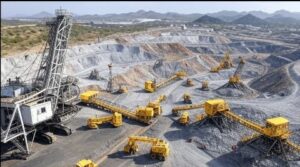Vancouver, B.C. – Prospero Silver Corp. (TSXV: PSL) (“Prospero” or the “Company”) announced today the results of an 870m diamond drill program at its Campana project in central Durango State, Mexico. Holes CAM-11-01 and CAM-11-02 focussed to the east and north of historic drilling (2007) that showed disseminated gold and silver mineralization over intersections up to 330m in length. The two-hole program, just finished, tested a zone characterized by chargeability and resistivity highs (Figure 1) as outlined by Z-TEM and IP surveys conducted earlier this year (refer to news releases of July 13, 2011 and August 29, 2011).
- Both holes encountered primarily coarse to fine grained diorite porphyry hosting explosive breccias dikes up to 16.8 meters in width with visible disseminated iron, zinc and lead sulphides, with values up to 0.35 g/t Au and 33 g/t Ag in breccias, and up to 59.5 g/t Ag in quartz-calcite veined diorite.
- Multiple mineralized intervals and diatreme breccia dikes similar to those encountered in historic holes are present in hole CAM-11-02, though they occur over shorter intervals. CAM-11-01 encountered a large intrusive body and was less mineralized.
- In CAM-11-01, the first 90 meters intersected a wedge of post-mineral volcanics, which appear as a shallow higher magnetic signature in Figure 1.
- Drilling to date, considered along with the results of the geophysical surveys, indicates strong potential for mineralization to be hosted peripheral to the intrusive body, particularly to the north and east where ground-based geophysics indicates zones of strong demagnetization (shown in dark blue in Figures 1 and 2).
- This drilling represents completion of Phase I evaluation of the geophysical program at Campana 1 target, and allows the Company to design a program for Phase II drilling.
| DRILL HOLE | DESCRIPTION | FROM (m) | TO (m) | CORE LENGTH (m) | Au g/t | Ag g/t | Pb ppm | Zn ppm |
|---|---|---|---|---|---|---|---|---|
| CAM-11-01 | Heavy iron oxide zone | 53.40 | 57.95 | 4.55 | 0.13 | 0.20 | 18 | 46 |
| And | Diorite with iron oxides | 99.75 | 108.75 | 9.00 | 0.18 | 0.28 | 22 | 60 |
| And | Breccia with sulfides | 405.10 | 414.70 | 9.60 | 0.19 | 9.36 | 282 | 555 |
| CAM-11-02 | Breccia with pyrite | 120.40 | 128.05 | 7.65 | 0.35 | 5.40 | 132 | 238 |
| And | Breccia with sulfides | 163.98 | 168.90 | 4.92 | 0.08 | 33.30 | 746 | 1496 |
| And | Diorite and breccias | 201.85 | 209.50 | 7.65 | 0.15 | 4.20 | 115 | 266 |
| And | Fault breccia zone | 215.55 | 218.07 | 2.52 | 0.20 | 10.00 | 297 | 533 |
| And | Fault zone and breccias | 238.00 | 240.66 | 2.66 | 0.11 | 4.80 | 78 | 224 |
| And | Fault zone with oxides | 270.95 | 273.98 | 3.03 | 0.13 | 2.40 | 22 | 119 |
| and | Breccia with sulfides | 290.25 | 307.05 | 16.80 | 0.18 | 5.40 | 112 | 296 |
| And | Cretaceous sediments | 415.39 | 417.93 | 2.54 | 0.11 | 4.50 | 180 | 620 |
| And | Breccia with sulfides | 434.60 | 438.50 | 4.25 | 0.13 | 7.10 | 105 | 861 |
| And | Quartz-calcite veinlets | 444.61 | 445.60 | 0.99 | 0.05 | 59.5 | 2680 | 1710 |
The review of this Phase 1 geophysical program highlights the importance of an extensive ground-based magnetic survey completed by the Company in 2009 (Figures 1 and 2). A two-pronged horn-shaped pattern of low magnetism occurs north and east of where holes CAM-11-01 and CAM-11-02 were drilled. The low magnetic responses reflect destruction of magnetic minerals and the possible presence of stronger hydrothermalism and mineralization. Results from CAM-11-01 and CAM-11-02 combined with the information gained from the ground-based magnetic survey direct further exploration to three target areas:
- A zone of low magnetism 700 meters by 300 meters extending to the north of historic hole CAM-12.
- A zone of low magnetism 1,000 meters long by 200-300 meters wide north and east of hole CAM-11-01 which follows the northeastern border of the large Z-TEM anomaly. Both of these zones appear as the deep low magnetic responses in Figure 2.
- A semi-circular zone containing both shallow and deep magnetism, measuring 600 meters by 400 meters, associated with modest chargeability (7 mV/V contour) is centered 1,500 meters east of the historic drilling (Figures 1 & 2) and represents an additional exploration target as yet untested.
“The information gained from the new holes drilled at Campana 1 and from the historic holes enable us to better understand the ground Mag data for the project,” said Tawn Albinson, President of Prospero Silver. “The ground Mag data will be a very important tool in guiding our drilling programs at Campana going forward,” he added.
A phase 2 drill program of 4,000m is required to test the target zones defined to date by the drilling and geophysical surveys.
Tawn Albinson, M.Sc., President of the Company, is a Qualified Person, as defined in NI 43-101, and is responsible for the technical content of this press release.
About Prospero Silver Corp.:
Prospero is a Canadian resource company with the majority of its staff based in Mexico and who work for its wholly owned subsidiary Minera Fumarola, SA de CV (Fumarola). Prospero’s objective is to quickly evaluate the properties currently optioned for their suitability to provide size potential and/or amenability for early production.
For further information please contact:
William Murray
Chairman
604-248-0797
or
Peter Murray
Contact Financial
604-689-7422
Forward-Looking Statement Cautions:
This news release contains certain “forward-looking statements” within the meaning of Canadian securities legislation, relating to the closing of a non-brokered Private Placement. Although the Company believes that such statements are reasonable, it can give no assurance that such expectations will prove to be correct. Forward-looking statements are statements that are not historical facts; they are generally, but not always, identified by the words “expects,” “plans,” “anticipates,” “believes,” “intends,” “estimates,” “projects,” “aims,” “potential,” “goal,” “objective,” “prospective,” and similar expressions, or that events or conditions “will,” “would,” “may,” “can,” “could” or “should” occur, or are those statements, which, by their nature, refer to future events. Factors that could cause actual results to differ materially from these forward looking statements include, but are not limited to, variations in the nature, quality and quantity of any mineral deposits that may be located, the Company’s inability to obtain any necessary permits, consents or authorizations required for its planned activities, and the Company’s inability to raise the necessary capital or to be fully able to implement its business strategies. The reader is referred to the Company’s reports, publicly available through the Canadian Securities Administrators’ System for Electronic Document Analysis and Retrieval (SEDAR) at www.sedar.com, including the risk factors discussed in Prospero’s November 27, 2009 prospectus. Except as required by securities laws and the policies of the TSX Venture Exchange, Prospero disclaims any intention or obligation to update or revise any forward-looking statement, whether as a result of new information, future events or otherwise.
Neither the TSX Venture Exchange nor its Regulation Services Provider (as that term is defined in the policies of the TSX Venture Exchange) accepts responsibility for the adequacy or accuracy of this release.



















